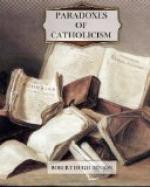The Catholic Church then is, and always will be, violent and intransigeant when the rights of God are in question. She will be absolutely ruthless, for example, towards heresy, for heresy affects not personal matters on which Charity may yield, but a Divine right on which there must be no yielding. Yet, simultaneously, she will be infinitely kind towards the heretic, since a thousand human motives and circumstances may come in and modify his responsibility. At a word of repentance she will readmit his person into her treasury of souls, but not his heresy into her treasury of wisdom; she will strike his name eagerly and freely from her black list of the rebellious, but not his book from the pages of her Index. She exhibits meekness towards him and violence towards his error; since he is human, but her Truth is Divine.
It is, then, from a modern confusion of thought with regard to the realms of the Divine and the Human that the amazing inability arises, on the world’s part, to understand the respective principles on which the Catholic Church acts in these two and utterly separate departments. The world considers it reasonable for a country to defend its material possessions by the sword, but intolerant and unreasonable for the Church to condemn, resisting even unto blood, principles which she considers erroneous or false. The Church, on the other hand, urges her children again and again to yield rather than to fight when merely material possessions are at stake, since Charity permits and sometimes even commands men to be content with less than their own rights, and yet again, when a Divine truth or right is at stake, here she will resist unfaltering and undismayed, since she cannot be “charitable” with what is not her own; here she will sell her cloak and buy that sword which, when the dispute was on merely temporal matters, she thrust back again into its sheath.
To-day[1] as Christ rides into Jerusalem we see, as in a mirror, this Paradox made plain. Thy King cometh to thee, meek. Was there ever so mean a Procession as this? Was there ever such meekness and charity? He Who, as His personal right, is attended in heaven by a multitude on white horses, now, in virtue of His Humanity, is content with a few fishermen and a crowd of children. He to Whom, in His personal right, the harpers and the angels make eternal music is content, since He has been made Man for our sakes, with the discordant shoutings of this crowd. He Who rode on the Seraphim and came flying on the wings of the wind sits on the colt of an ass. He comes, meek indeed, from the golden streets of the Heavenly Jerusalem to the foul roads of the Earthly, laying aside His personal rights since He is that very Fire of Charity by which Christians relinquish theirs.
[Footnote 1: This sermon was preached on Palm-Sunday.]




